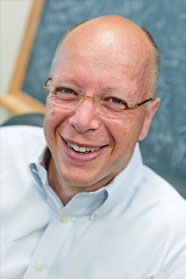 Mark Crovella
Mark Crovella
When Professor Mark Crovella was elevated to a fellow position at the Institute of Electrical and Electronics Engineers earlier this year, it was just the latest milestone in a very successful career. Mark, who is also an Association for Computing Machinery fellow, has been teaching at BU since 1994, is the author of over 100 papers on networking and computer systems, and holds five patents deriving from his research.
Mark’s research interests are rooted in performance evaluation, focusing on parallel and networked computer systems. His work to identify unusual patterns in online activities—statistical anomalies in the amount or type of data being transferred—has led him to develop a technique to detect damaging computer viruses. His technique—based on a method called principal component analysis and licensed to Guavus, Inc., a venture-backed binational company led by one of Crovella’s former PhD students, Anukool Lakhina (CAS’01, GRS’01, ’07)—is now being used by GÉANT, Europe’s main multigigabit computer network, for research and academic purposes. You can read the full BU Today article on Mark’s virus detection work here.
He is the coauthor of Internet Measurement: Infrastructure, Traffic, and Applications (Wiley Press, 2006). He is also one of the lead researchers on a $3 million, five-year smartphone security project funded by the National Science Foundation. The project, which got under way last fall, aims to understand how security problems associated with softphones and their networks are different from those of traditional computers and networks, and how to harness the unique capabilities of softphones for improved security.
In the networking arena, Mark has worked on characterizing the Internet and the World Wide Web. He has also explored the presence and implications of self-similarity and heavy-tailed distributions in network traffic and Web workloads. His paper (with Azer Bestavros) “Self-Similarity in World Wide Web Traffic: Evidence and Possible Causes” is listed by Citeseer as one of the most cited papers in Computer Science.
Mark received a BS from Cornell University in 1982, and an MS from the State University of New York at Buffalo. He received his PhD in Computer Science from the University of Rochester in 1994. From 1984 to 1994, he worked at Calspan Corporation in Buffalo NY, eventually as a Senior Computer Scientist.
Material from BU Today was used for this article. Read the BU Today profile on Mark here, and a Bostonia profile on him here.